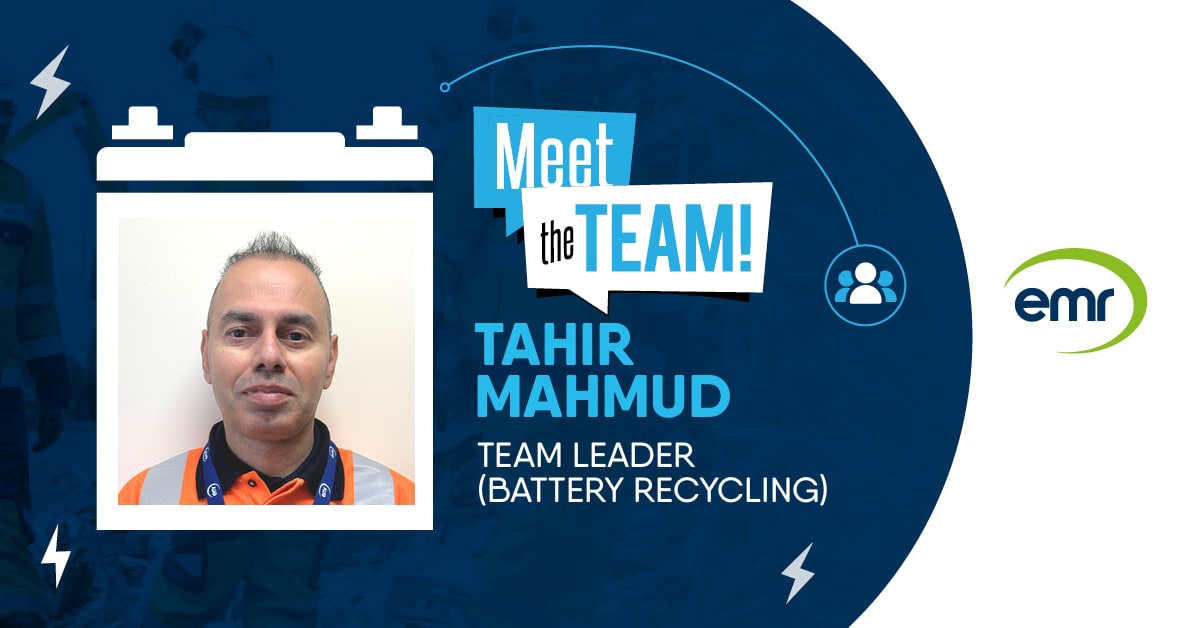CHOOSE
A DIFFERENT TERRITORY
As the automotive industry approaches its greatest upheaval in a century, EMR is investing now to ensure that its expertise in end-of-life vehicle (ELV) recycling remains market leading in the impending era of electric vehicles (EVs).

For Tahir Mahmud, Team Leader at the company’s brand-new battery centre - based at EMR Birmingham - this means building a team with the high voltage skills required to establish a pioneering circular economy for these vehicles’ powerful batteries.
“My team’s main role is to first safely remove the high voltage battery from each vehicle and carefully carry out disassembly, protecting the valuable materials they contain,” he says. “There has been a lot of training to make sure our team is ready – EV battery recycling is going to continue to grow from here, so it's important to get it right from the start.”
So, how does the new site operate?
“For all ELV batteries which arrive on site, we will look for opportunities to reuse or recycle them in the most environmentally friendly way possible. Before that journey starts, however, you need a lot of data about how every battery is performing. So, when it’s safely removed, our team conducts an initial assessment where we weigh the battery, check its battery passport (a unique QR code located on the battery pack), conduct isolation and continuity tests and record everything in our stock sheet,” Tahir explains. “From there, we take the battery into one of our specialist pods, where we do the assessment again. If we can’t find an opportunity to reuse or remanufacture the battery, we then carry out a full disassembly.”
Once each component of the battery is separated, any steel or non-ferrous metal can be recycled by EMR, ready to be used in the products of tomorrow.
Plastics can be processed by MBA Polymers (EMR’s plastics recycling arm) and parts that contain rare-earth metals, such as lithium, nickel, and cobalt, can be sent to specialist recyclers for further processing.
“There is a lot of learning happening across the industry – and EMR is no different. This is a pilot site where we are developing new skills and methods of work which will be used – more and more - as EV sales grow and the battery recycling industry scales up. At the same time, a lot of the vehicles that are currently arriving on site are the prototypes of the next generation of EVs – so it’s great exposure for our teams to see how the industry’s changing and to prepare for any upcoming challenges.
By moving early, we are also gaining a competitive advantage, ensuring we have solutions in place for these ELV batteries as more and more vehicles electrify.”
As the EV battery recycling industry grows, it is also essential to recognise the broader implications of training our workforce beyond just the technical skills needed to handle ELVs. Mobility and adaptability will be key, not just within EMR, but across the entire industry, as these skills can open doors to a range of emerging technologies and industries. Preparing our teams ensures that they are equipped not only for current challenges but also for the future demands of a rapidly evolving, technological landscape.
For now, however, the site has begun to process its first EV batteries, Tahir and his team have needed to learn fast and adapt their methods:
“Safety is the number one priority at the facility. Vehicles arrive at the plant in such a wide variety of conditions, and our teams have to be careful. We ensure all our staff are fully trained and have a range of processes in place to keep them safe. For example, we’ve implemented a traffic light system, where very damaged, high-risk batteries can be identified as ‘red’ and will undergo a very different set of processes than the best performing ‘green’-rated batteries.”
While the site is performing an essential task in making EVs more sustainable, Tahir says EMR has also invested in a host of green technologies of its own.
“We have electric fork-lifts, an electric crane, and an electric floor cleaner for the site, to name a few examples. We are also able to use the discharge energy we remove from vehicles to power this equipment and can even return it to the grid. It means we can make battery recycling even more circular,” he adds.
Tahir – who completed a Higher National Certificate (HNC) in Electrical and Mechanical Engineering – began his career maintaining and operating the huge printers used by media group Trinity Mirror.
“The pandemic saw sales of newspapers fall and our site was closed, but – fortunately - I saw this role advertised at EMR. It’s enabled me to really apply the knowledge and skills from my HNC training to a technology that’s set to change the world.”
And, with the facility now fully operational, Tahir and his team are ready to embrace the challenges and opportunities that lie ahead for battery recycling in the UK.
Read about other people who make EMR a great place to work, learn about our culture and values, or see our latest vacancies.